目次
大幅な改変も加えながらなんとか完成させた『資本論』第3巻「マルクスとエンゲルスの生涯と思想背景に学ぶ」(67)
あわせて読みたい
年表で見るマルクスとエンゲルスの生涯~二人の波乱万丈の人生と共同事業とは
これより後、マルクスとエンゲルスについての伝記をベースに彼らの人生を見ていくことになりますが、この記事ではその生涯をまずは年表でざっくりと見ていきたいと思います。
マルクスとエンゲルスは分けて語られることも多いですが、彼らの伝記を読んで感じたのは、二人の人生がいかに重なり合っているかということでした。
ですので、二人の辿った生涯を別々のものとして見るのではなく、この記事では一つの年表で記していきたいと思います。
上の記事ではマルクスとエンゲルスの生涯を年表でざっくりとご紹介しましたが、このシリーズでは「マルクス・エンゲルスの生涯・思想背景に学ぶ」というテーマでより詳しくマルクスとエンゲルスの生涯と思想を見ていきます。
これから参考にしていくのはトリストラム・ハント著『エンゲルス マルクスに将軍と呼ばれた男』というエンゲルスの伝記です。
あわせて読みたい
トリストラム・ハント『エンゲルス マルクスに将軍と呼ばれた男』あらすじと感想~マルクスを支えた天才...
この伝記はマルクスやエンゲルスを過度に讃美したり、逆に攻撃するような立場を取りません。そのような過度なイデオロギー偏向とは距離を取り、あくまで史実をもとに書かれています。
そしてこの本を読んだことでいかにエンゲルスがマルクスの著作に影響を与えていたかがわかりました。
マルクスの伝記や解説書を読むより、この本を読んだ方がよりマルクスのことを知ることができるのではないかと思ってしまうほど素晴らしい伝記でした。マルクスの伝記に加えてこの本を読むことをぜひおすすめしたいです。
この本が優れているのは、エンゲルスがどのような思想に影響を受け、そこからどのように彼の著作が生み出されていったかがわかりやすく解説されている点です。
当時の時代背景や流行していた思想などと一緒に学ぶことができるので、歴史の流れが非常にわかりやすいです。エンゲルスとマルクスの思想がいかにして出来上がっていったのかがよくわかります。この本のおかげで次に何を読めばもっとマルクスとエンゲルスのことを知れるかという道筋もつけてもらえます。これはありがたかったです。
そしてこの本を読んだことでいかにエンゲルスがマルクスの著作に影響を与えていたかがわかりました。かなり驚きの内容です。
この本はエンゲルスの伝記ではありますが、マルクスのことも詳しく書かれています。マルクスの伝記や解説書を読むより、この本を読んだ方がよりマルクスのことを知ることができるのではないかと思ってしまうほど素晴らしい伝記でした。
一部マルクスの生涯や興味深いエピソードなどを補うために他のマルクス伝記も用いることもありますが、基本的にはこの本を中心にマルクスとエンゲルスの生涯についてじっくりと見ていきたいと思います。
その他参考書については以下の記事「マルクス伝記おすすめ12作品一覧~マルクス・エンゲルスの生涯・思想をより知るために」でまとめていますのでこちらもぜひご参照ください。
あわせて読みたい
マルクス伝記おすすめ12作品一覧~マルクス・エンゲルスの生涯・思想をより知るために
私はマルクス主義者ではありません。
ですが、マルクスを学ぶことは宗教や人間を学ぶ上で非常に重要な意味があると考えています。
なぜマルクス思想はこんなにも多くの人を惹きつけたのか。
マルクス思想はいかにして出来上がっていったのか。
そもそもマルクスとは何者なのか、どんな時代背景の下彼は生きていたのか。
そうしたことを学ぶのにこれから紹介する伝記は大きな助けになってくれます。
では、早速始めていきましょう。
エンゲルスによる『資本論』第3巻の編集
一八九四年に『資本論』の最後の第三部「資本主義的生産の総過程」を上梓したときですら、問題は未解決のままだった。
エンゲルスはひどく心配してはいなかった。彼はマルクスの最高傑作の最終部を、第一部よりもさらに影響力のある重要なものだと見なしていた。
「われわれの理論はこれによって初めて否定できない根拠を与えられる一方で、われわれ自身はあらゆる方面でうまく論破できるようになった」と、彼は自信たっぷりにアウグスト・べーべルに書いた。
「これ[第三部]が刊行されたらすぐに、党内の俗物たちは再び打撃を受けて、何かしら考えるようになるだろう」。
しかし、原稿はそれまでの二部よりもさらに悲惨な状態にあり(「銀行と信用に関する部分は相当に困難だ」)、メモや下書き、言い換え、方程式などがごちゃ混ぜになった、めまいのするような紙の山となっていた。
だが、マルクスがいないために、安堵できる一面もあった。エンゲルスはようやく自分がふさわしいと思うように自由に文章を練り、説明を滑らかにし、文章中の目障りなものを取り除くことができるようになったのだ。
「最後を飾るこの第三部はじつに見事で、まったく反論の余地のない作品なので、僕は議論の全容が明確に、くっきりと浮き彫りになるようなかたちで、これを世にださなければならないと考えている」と、彼はニコライ・ダニエリソーンに語った。
※一部改行しました
筑摩書房、トリストラム・ハント、東郷えりか訳『エンゲルス マルクスに将軍と呼ばれた男』P393-394
この箇所もなかなか強烈ですよね。
マルクスの『資本論』の第三巻はこれまでのものよりもさらにひどい状態だったようです。マルクスが実際に書き終えた第1巻ですら悲惨なもので、エンゲルスがかなり編集を加えていたことは以前の記事「『資本論』第1巻の段階ですでに膨大な原稿を編集していたエンゲルス「マルクスとエンゲルスの生涯と思想背景に学ぶ」(51)」でも述べました。
あわせて読みたい
(51)『資本論』第1巻の段階ですでに膨大な原稿を編集していたエンゲルス。やはりエンゲルスなしではマ...
マルクスの『資本論』は読むのがあまりにも難しい作品として有名ですが、マルクスの元の原稿はそれどころではない支離滅裂なものだったというのは驚きでした。その解読困難な原稿をかろうじて読める形でエンゲルスが再構成したものが私たちが手にする『資本論』だったのです。
『資本論』第2巻、第3巻がエンゲルスによる編集によって成立したのは有名ですが、そもそも第1巻からしてエンゲルスの多大な貢献があったのでした。
そして前回の記事でお話した第2巻はそのあまりのひどさにエンゲルスが眼を病んでしまったという代物でした。
あわせて読みたい
(66)『資本論』第2巻の編集に苦闘するエンゲルス
エンゲルスは『資本論』第1巻の時点ですでにマルクスの膨大な原稿を編集していました。マルクスが存命の時ですらこの作業に苦戦していたエンゲルスです。
マルクスの死後はどうだったのでしょうか。
その作業は想像を絶する苦難の道となったのでした。
解読困難な悪筆、支離滅裂な文章、無秩序な引用に満ちた膨大な原稿の山。
エンゲルスはこの編集作業によって眼を病んでしまうほどでした
この記事ではその詳しい顛末と『資本論』第2巻、3巻の問題点についてお話ししていきます。
その第1巻、第2巻よりさらに悲惨な状態だったとすればそれはもはや明らかに作品としての体は成していなかったものと思われます。まさにメモの山状態・・・
ですが上で語られますように、もはやマルクスはいないということでエンゲルスはかなり自由に編集を加えていったようです。次の箇所ではそのエンゲルスの改変について語られています。
エンゲルスによる『資本論』第3巻の改変
一九九三年にマルクスのオリジナルの第三部の原稿が出版され、〔エンゲルス〕の編集がいかに自由な主導権をもって実施されていたかが明らかになっている。
「議論の筋道」を明確にするために、エンゲルスは本文に脚注を組み入れ、節を合体させ、細分割したり彼自身の考えを挿入したりしていたのだ。
場合によってはマルクスの意図を変えたところもあり、なかでも議論の的となった第三篇「利潤率の傾向的低下の法則」では顕著に見られた。
マルクスはここで資本主義のもとでいかに利潤が減る傾向にあるかを概説した。
人手を省く産業技術が、徐々に生きた労働から余剰価値を引きだす余地を減らすためである。マルクスはこの利益性の低下傾向を、資本主義そのものの脆弱性と結びつけた。
だが、マルクスのオリジナルの原稿は資本主義的生産の「動揺」について語っているのにたいし、エンゲルスはより断定的に資本主義の「崩壊」について語った。わずかな変更だが、二十世紀のマルクス主義者にとっては広範な影響力をもたらすもので、彼らは繰り返し資本主義の体系全般の「危機」や「破綻」を追い求め、共産主義の夜明けを迎え入れようとした。
マルクスのブルドッグはほんのつかの間、紐からすり抜けたようだが、それはすべて、大義のより大きな利益のためだった。
「エンゲルスは単なる編集者ではなく、マルクスの遺産の管理人と編集者が一体になった存在でありたかったのだ」と、近年のある学者はそれについて述べる。
「エンゲルスはマルクスの原稿を、それが対象とした相手である利用者のために読みやすくした版を制作した。理論を知っている労働者と、文献学的に関心をもつ学者にまでまたがる集団である」。
そして、第三部が出版されたことで、彼は少なくとも仕事をやり終えたと、マルクスの思い出は尊重されたと感じたのだった。
「マルクスの『資本論』との君の長い航海がほぼ終わったことを喜ばしく思う」と、エンゲルスの古いチャーティスト運動仲間のジュリアン・ハーニーは一八九三年に彼に書いた。「マルクスが君に見出したほど、忠実で献身的な友人および擁護者は、少なくとも近代においては、ほかにはどこにも例を見なかったと私は思う」
※一部改行しました
筑摩書房、トリストラム・ハント、東郷えりか訳『エンゲルス マルクスに将軍と呼ばれた男』P394-395
マルクス亡き後、彼の思想を広めるためにそれこそ身を粉にして奮闘していたエンゲルス。
そのエンゲルスがマルクスの原稿に手を加え『資本論』第3巻は完成という形となりました。
ただ、はたしてこれがマルクスの作品、思想であると言えるのかは微妙なものなのではないでしょうか。これまでの記事を読んで下さった皆さんもきっとそう思うのではないかと思います。
メモの集積をつなぎ合わせたものを果たしてその人の作品、思想と呼べるのか。
しかもそのメモ自体も、膨大な文献を読んでいたマルクスが無秩序に蓄えていたものにすぎません。思想として体系立ててそれが書かれていたかというと疑問が残ります。
専門家ではない私にはこれ以上のことは言えませんが、『資本論』第3巻はこうしてエンゲルスによって完成されたのでありました。
Amazon商品ページはこちら↓
エンゲルス: マルクスに将軍と呼ばれた男 (単行本)
次の記事はこちら
あわせて読みたい
(68)1895年のエンゲルスの死と莫大な遺産について~最後まで規格外の男だったエンゲルス
エンゲルスの遺産はなんと400万ドル、現代の日本円で軽く4億円以上もあったようです。そこにさらに様々な形の資産もあったでしょうから総額で言えばとてつもないものがあったと思われます。そしてそれらのほとんどはマルクス一族に相続されることになりました。
またエンゲルスは本人の希望により死後海洋散骨されることになります。彼のお墓はこの世に存在しないのです。これには私も驚きました。
前の記事はこちら
あわせて読みたい
(66)『資本論』第2巻の編集に苦闘するエンゲルス
エンゲルスは『資本論』第1巻の時点ですでにマルクスの膨大な原稿を編集していました。マルクスが存命の時ですらこの作業に苦戦していたエンゲルスです。
マルクスの死後はどうだったのでしょうか。
その作業は想像を絶する苦難の道となったのでした。
解読困難な悪筆、支離滅裂な文章、無秩序な引用に満ちた膨大な原稿の山。
エンゲルスはこの編集作業によって眼を病んでしまうほどでした
この記事ではその詳しい顛末と『資本論』第2巻、3巻の問題点についてお話ししていきます。
関連記事
あわせて読みたい
マルクス主義者ではない私がなぜマルクスを学ぶのか~宗教的現象としてのマルクスを考える
マルクスは宗教を批判しました。
宗教を批判するマルクスの言葉に1人の宗教者として私は何と答えるのか。
これは私にとって大きな課題です。
私はマルクス主義者ではありません。
ですが、 世界中の人をこれだけ動かす魔力がマルクスにはあった。それは事実だと思います。 ではその魔力の源泉は何なのか。 なぜマルクス思想はこんなにも多くの人を惹きつけたのか。 そもそもマルクスとは何者なのか、どんな時代背景の下彼は生きていたのか。 そうしたことを学ぶことは宗教をもっと知ること、いや、人間そのものを知る大きな手掛かりになると私は思います。
あわせて読みたい
(52)マルクスの宣伝マン・エンゲルスの天才的な広告手腕!~彼なくしてマルクス思想の繁栄なし
私たちは「マルクスが後に世界中に広まった」という歴史を知った上でマルクスを見てしまいますが、当時の状況はまるで違います。
このままでは無視されかねないと察したエンゲルスはここでその才能を発揮します。
エンゲルスは自作自演も辞さず、次々とメディア戦略に打って出ました。「単なる経済学の書」を超えた、まさしく「あらゆるものの源泉たるバイブル」としての『資本論』を生み出したのはエンゲルスだったのでした。
エンゲルスなくしてマルクスなし!
エンゲルスの参謀としての天才的な能力には驚くしかありません。
あわせて読みたい
(61)『資本論』第2巻、3巻を完成できぬまま亡くなるマルクス~盟友エンゲルスはどう動く?
1881年、マルクスは妻の最後を看取ることもできず、自身も病気と闘っていました。世界を動かした巨人マルクスも、晩年は病気に苦しめられ、執筆もほとんど捗ることがありませんでした。
そしてマルクスは『資本論』第2巻、3巻を完成させることなく1883年に亡くなります。
ですがマルクスが死しても、マルクスの物語は終わりません。むしろ、死して後、彼の思想はより巨大なものとなって世界中に大きな影響を与えることになります。そこにいたのはやはりあの男、エンゲルスでした
あわせて読みたい
(62)葬儀でのエンゲルスの演説とマルクスの神格化のはじまり
後に数え切れないほどの人たちに影響を与えることになった大人物マルクスの葬儀に参列したのはたったの11人・・・
これには私も驚きました。
ですが逆に言えば、ほとんど世に知られていない、あるいは評価されていなかったマルクスがここからいかにして世界中に旋風を巻き起こしていったのかというのは気になるところでありますよね。
となると、ここからあの男がいよいよ存在感を増してくることになります。
エンゲルスの働きがここからいよいよ大きなものとなっていくのでした。
あわせて読みたい
ジャック・バーザン『ダーウィン,マルクス,ヴァーグナー 知的遺産の批判』あらすじと感想~なぜ彼らは世...
この本は「ダーヴィンとマルクスがなぜこんなにも世界を席巻したのか」という、私が最も知りたかったことを解説してくれる刺激的な作品でした!これは面白いです!
この作品については以前マルクスの『資本論』を読んだ際にも参考にしました。
『資本論』はあまりに難解で膨大な作品ですが、「その理解不能さが逆に世の中から聖書のように扱われる大きな理由となった」という著者の説は非常に興味深いものがありました。
あわせて読みたい
マルクス『資本論』を読んでの感想~これは名著か、それとも・・・。宗教的現象としてのマルクスを考える
『資本論』はとにかく難しい。これはもはや一つの慣用句のようにすらなっている感もあります。
この作品はこれ単体で読んでも到底太刀打ちできるようなものではありません。
時代背景やこの本が成立した過程、さらにはどのようにこの本が受容されていったかということまで幅広く学んでいく必要があります。
私がマルクスを読もうと思い始めたのは「マルクスは宗教的現象か」というテーマがあったからでした。
ここにたどり着くまで1年以上もかかりましたが、マルクスとエンゲルスを学ぶことができて心の底からよかったなと思います。
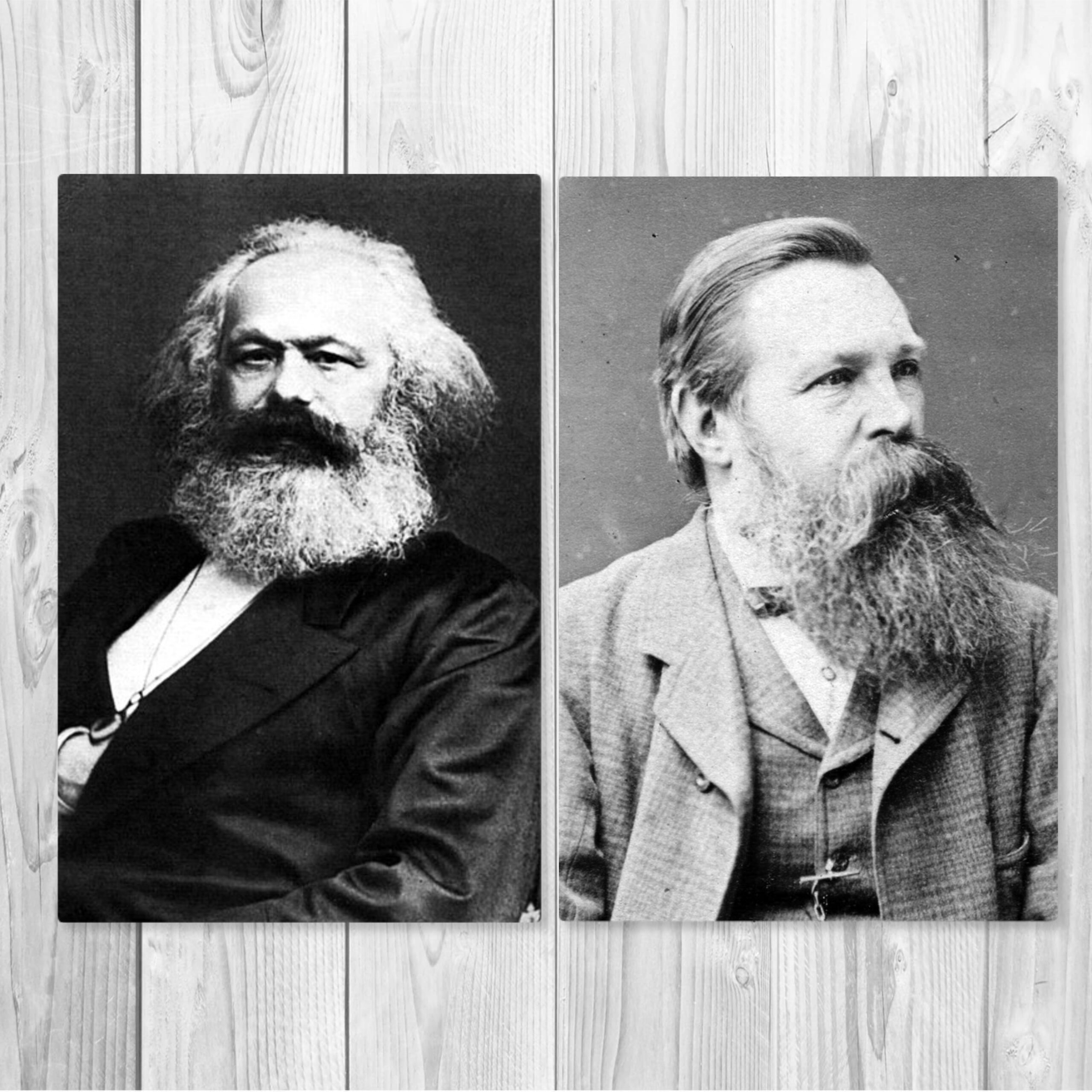
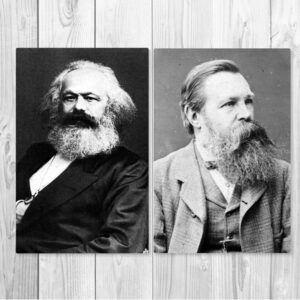
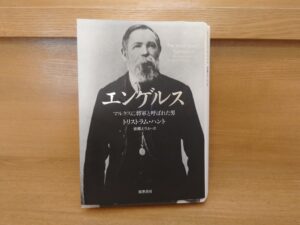


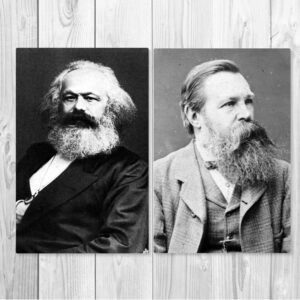
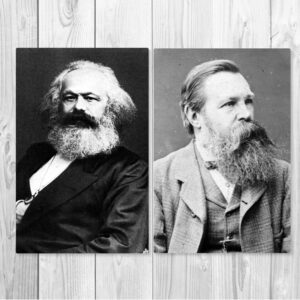

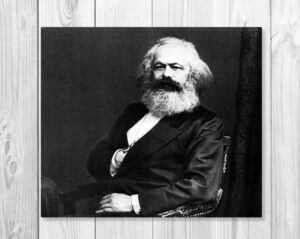



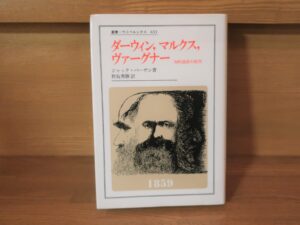


コメント